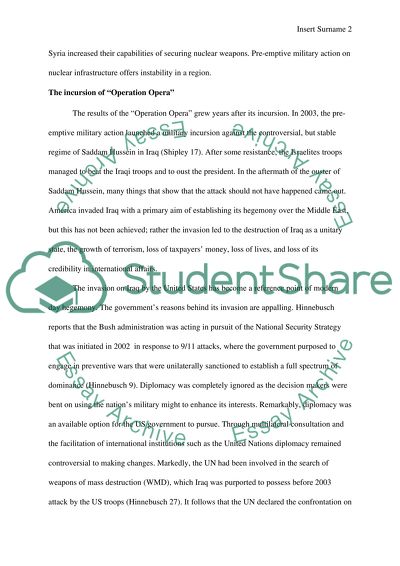Cite this document
(“With reference to 20th century military action in Iraq, Syria and more Essay”, n.d.)
With reference to 20th century military action in Iraq, Syria and more Essay. Retrieved from https://studentshare.org/social-science/1655919-with-reference-to-20th-century-military-action-in-iraq-syria-and-more-recently-clandestine-approaches-in-iran-does-pre-emptive-military-action-on-nuclear-infrastructure-offer-stability-or-instability-to-the-region
With reference to 20th century military action in Iraq, Syria and more Essay. Retrieved from https://studentshare.org/social-science/1655919-with-reference-to-20th-century-military-action-in-iraq-syria-and-more-recently-clandestine-approaches-in-iran-does-pre-emptive-military-action-on-nuclear-infrastructure-offer-stability-or-instability-to-the-region
(With Reference to 20th Century Military Action in Iraq, Syria and More Essay)
With Reference to 20th Century Military Action in Iraq, Syria and More Essay. https://studentshare.org/social-science/1655919-with-reference-to-20th-century-military-action-in-iraq-syria-and-more-recently-clandestine-approaches-in-iran-does-pre-emptive-military-action-on-nuclear-infrastructure-offer-stability-or-instability-to-the-region.
With Reference to 20th Century Military Action in Iraq, Syria and More Essay. https://studentshare.org/social-science/1655919-with-reference-to-20th-century-military-action-in-iraq-syria-and-more-recently-clandestine-approaches-in-iran-does-pre-emptive-military-action-on-nuclear-infrastructure-offer-stability-or-instability-to-the-region.
“With Reference to 20th Century Military Action in Iraq, Syria and More Essay”, n.d. https://studentshare.org/social-science/1655919-with-reference-to-20th-century-military-action-in-iraq-syria-and-more-recently-clandestine-approaches-in-iran-does-pre-emptive-military-action-on-nuclear-infrastructure-offer-stability-or-instability-to-the-region.


